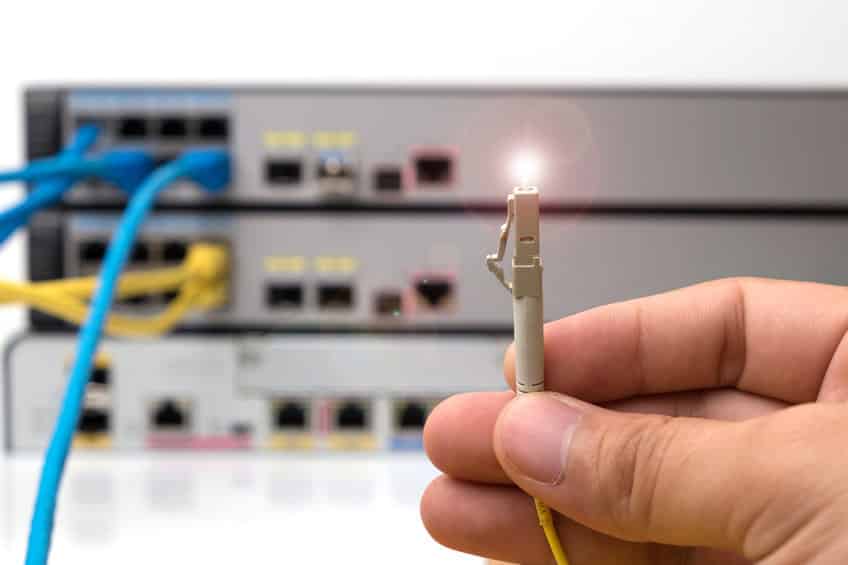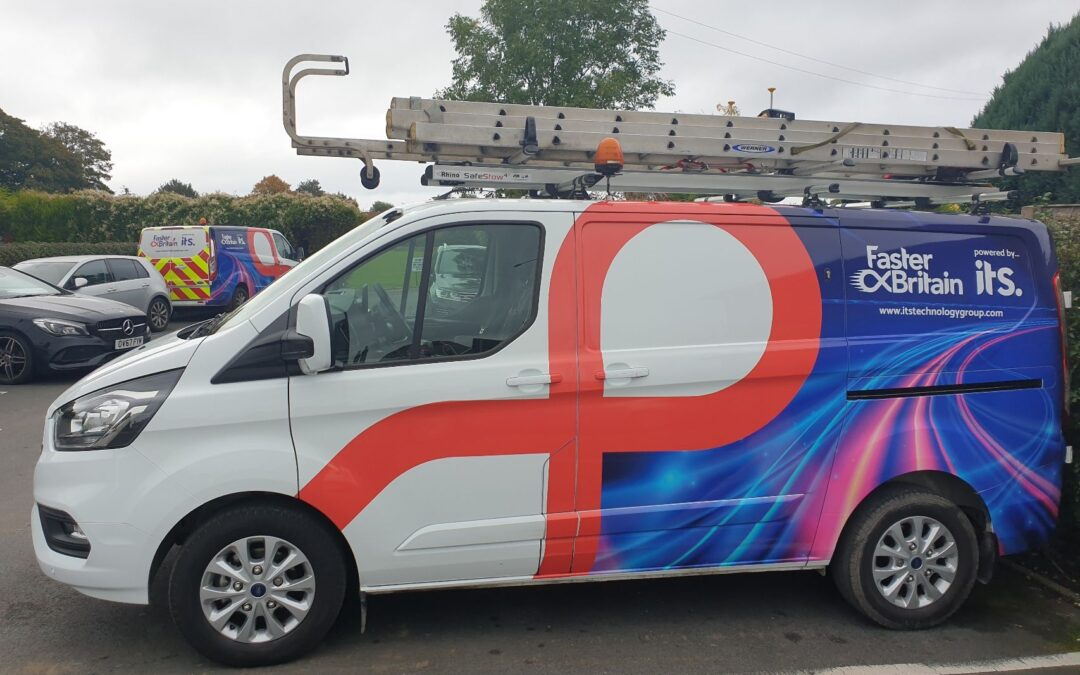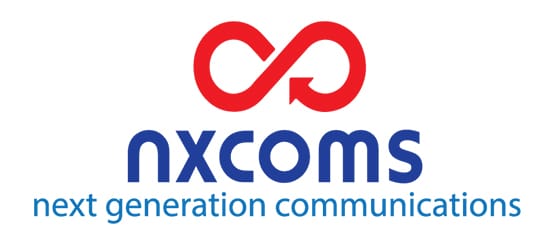
May 15, 2023 | Blog, Connectivity, Faster Britain, News
Welcome to the world of fibre optic broadband! It’s good to be here, isn’t it? You’re about to get your hands on more bandwidth than you know what to do with and lightning-fast internet speed. Perfect business internet conditions.
Oh, hang on. Hold those horses. You’re not going with one of the telecoms giants, are you?
Is that really the right choice? Size isn’t everything you know.
Here are five solid reasons not to go with one of the big names for your business internet.
Slow Response Times When Things Go Wrong
Most customers expect fast response times, 24/7. If you’re one of them, think twice about choosing one of the big-league business internet providers over smaller telecom companies.
Larger organisations receive such a vast number of calls that, naturally, response times are much slower. Don’t mind waiting around for a few more minutes, you say? Think about your customers. Issues and mistakes in your communications mean your business is not functioning properly. And if your business isn’t functioning, you’re losing business.
Business owners need their problems sorted FAST, not wait around for a call agent to become available. If your internet is consistently dropping out or is excruciatingly slow, you need it fixed, right? (Click the links to read our recent blogs on these topics!)
Smaller comms providers usually have a reduced but highly attentive team of tech support. With fewer calls in the queue and more time to give you, you’ll be back up and running in no time.
Impersonal Approach
Not only do the big companies have less time for you, even as their ‘valued customer’, but they won’t know anything about you.
Not really. Only the cold facts – how much you’re paying them and what they should be getting.
How are the 15 different tech support staff you spoke to in the last year supposed to retain any information about the 300 separate business internet customers on the books?
It’s a shame, because any small business owner will tell you that taking the time to understand the setup of a customer’s company is integral to providing them with the best service possible. And the story is no different when choosing a smaller comms provider for your business internet. These guys strive to build trusting, long-term relationships with their customers and really live the whole ‘customer comes first’ vibe.
One Size Doesn’t Fit All
Hey, this follows on rather nicely! (It’s almost like we planned it or something).
Communications solutions can be complex, and the off-the-shelf packages available with larger business internet providers don’t always fit the bill.
Getting to grips with what a customer’s business is all about and how it works means smaller telecoms providers can tailor their offerings to suit particular wants and needs. They can offer bespoke solutions to fulfil particular requirements and understand that pre-packaged products are often too costly or completely wrong for many business owners.
Business Internet Contracts Can Be Complex
In the big leagues, products and the contracts that come with them can be impossible to compare. This makes it extremely difficult for customers to make informed choices.
Telecommunications is an area of business that is in constant evolution. With new ways of networking continuously cropping up, it’s a multi-legged beast, making telecom contract management very complicated.
Some businesses adopt a telecom procurement strategy to ensure they don’t overpay for something that doesn’t even meet their needs.
Little Consideration For Local Community
Because massive corporations span countries, and even continents, rather than sitting in a single location, they don’t develop positive business partnerships with local companies. There’s no need to, and no real opportunity.
Smaller companies most often enjoy being an integral part of the community around them. Fostering local business partnerships and providing great customer service means small, local companies can generate a tangible, positive reputation in their region. Buying the services of smaller telecom companies also reduces carbon emissions and creates jobs in the local area.
Smaller Business Internet Providers Will Look After Your Needs
There are plenty out there, but choosing a local telecom provider means you are stimulating your local economy and supporting the community that surrounds you.
Need fantastic customer service and fast fixes if things go wrong? Looking for a company that has the time to listen, get to know your business inside out and design a solution that will do what you actually need it to?
Shop small. You won’t regret it!
Not quite ready to make the switch yet but wondering why your business internet is so slow? Read our recent blog to find out what could be causing it.

Feb 27, 2023 | Blog, Connectivity, Faster Britain, News
Is your business broadband slow? Is it letting you, your staff and your customers down? Can you make 3 whole TikTok videos in the time it takes for your internet pages to load?
Have you had to give an awkward ‘sorry’ to valued customers while you earnestly hit buttons in a desperate attempt to get your business back online? There’s nothing much worse, hey?
It makes you look bad. Your business seems unreliable and unprofessional. And that’s the last thing you need.
So why is your business broadband slow?
It’s probably relying on an outdated network – made from copper. And like all outdated systems, they have to hand on the baton of glory at the end of their race.
Here’s why the copper network has passed the finish line…
What Are Copper Cables?
For many, the internet has always just been there. Even if you can remember days pre-cable-connection, no doubt you too, find it hard to imagine life now without access to the world that lives through and thanks to, the internet.
Just imagine. No online shopping, no facetime with your favourites, no Googling a term you heard someone say (and pretended to know what they meant), no learning new things through YouTube or getting the latest goss from social media. Crazy, huh?
We’re all so used to firing up our laptops or scouring social media without much thought to how it all works. Who cares how it works?! Well nobody, until it doesn’t…
Copper cables make up a vast underground network that was originally set up to allow voice calls to connect via telephones. Laid over 100 years ago (yes, that old), copper cables brought us the first working telephones. They’ve been a triumph for sure.
Those exceptional but tired copper cables link your business to the nearest connection point – those green cabinets that sit unnoticed in your nearby road, that’s them! Who knew?!
The copper cables transmit data. All that communication for your business? Passed along as electrons and electrical pulses along copper wires that are more than a century old…no wonder they’re struggling with current information transmission!
Why Are They Making Your Business Broadband Slow?
Because of the way data is transferred along copper cables; as electrical pulses running along copper wires, the information can get a little, well, lost. The longer the span of copper is, the more likely it will render your business broadband slow and unfit for purpose.
So if your business happens to operate a long way from one of those green network cabinets, you probably struggle with the chaos of slow broadband.
With so many more of our business operations requiring a broadband connection, it’s no wonder copper cables simply can’t manage to keep up with the demand. They were designed for a different era, 1877 in fact – yeah that far back. Life looks pretty different these days, doesn’t it?
Since then, copper cables have had more leases of life than a Jamie Oliver cookbook, so they can continue to deliver broadband services for our homes and businesses for as long as they have. But it’s time for them to now hang up their coats and enjoy a well-deserved rest.
We salute you, copper cables!
The Impact Of Slow Internet
Let’s be honest, while copper cables will deservedly have a large section in our history books, their shortcomings can have a disastrous impact on your business operations and reputation.
Made a big sale at a weekend show, only for your card machines to fail? Expectant queues form, but sales are impossible. Wasted time and disappointed customers. Poor broadband can literally stop your salary.
Do you or your team work remotely? Then you rely on efficient broadband to stay connected and keep your business running smoothly. Without reliable service, not only is your business broadband slow; but you’re also isolated and simply unable to provide your service. You might as well be back in 1877…
Then your staff get fed up and disgruntled. They start to murmur expletives under their breath while waiting for pages to load. They become more and more dissatisfied with their working day. They can’t get on with the job they’re paid to do. The best of the bunch will care. Bad broadband could literally cost you your talented team.
Then there are your clients and customers. What does it look like to them when you can’t see or reply to emails? When you have to apologise profusely for slow service. Or those times you can’t even chat to them ‘cos your phone line is too rubbish? They mark you as unreliable, and inefficient, then run into the arms of your competitors. Damn.
Is Your Business Broadband Slow?
“What should I do?!” we hear you cry.
Thankfully, the solution is easy and simple – fibre optic broadband is waiting in the wings, ready to be your knight in shining glass fibre.
Plus the ‘Big Switch Off’ is happening in 2025 (the copper connection will be disconnected for good), so the sooner you leave it behind, the better. Beat the business backlog by booking an appointment with a trusted provider now.
Want to know more about the ‘Big Switch Off’ and what it means for you and your business? Check out our recent post with all the essential info you need here.

Feb 8, 2023 | Blog, Connectivity, Faster Britain, News
Do you know your broadband from your fibre optic? What does fibre optic really mean, and what’s it got to do with broadband anyway?
We hear the terms all the time, don’t we? Most of us have a vague understanding of what’s being said. We catch the gist. It’s enough to get us through. Just.
Most often, ‘fibre optic’ and ‘broadband’ are used interchangeably. They’re one and the same thing, aren’t they?
Not quite. If you’re still unsure about the comparison of fibre optic vs broadband, let’s clean up the confusion…
Fibre Optic Vs Broadband: What Is Broadband?
Broadband is defined as ‘the transmission of wide bandwidth data over a high-speed internet connection’.
So that’s cleared it all up for you, right?
Didn’t think so; let’s try again…
Broadband is your ability to access the internet from your devices. Okay, we’re getting a little closer.
Third time lucky?
Basically, broadband is the connection you have to the internet. Hurrah!
But there are different types of broadband, and that’s where the confusion creeps in. How your business connects to the internet can vary, from copper networks, satellite, wireless and fibre.
Fibre Optic Vs Broadband: What Is Fibre Optic?
With this in mind, the ‘fibre optic vs broadband’ comparison is really a false one.
So what’s all this mention of fibre optic? It’s the latest and greatest internet connection around. Thin, flexible fibres with a glass core are being laid to replace the outdated copper cable network, which happens to be more than a century old – yep — definitely time for that brilliant but worn-out system to rest.
In contrast, fibre optic cables transmit all your business communications and internet happenings via light signals along the glass fibre. Light travels fast, right? So too, does fibre optic broadband.
Not only are fibre optic cables faster, but they’re also more reliable and greener too. Impressive.
Tell you more? Oh, okay then…
Fibre Optic Vs Broadband: What’s The Difference?
Up until recently, broadband has connected your business to the internet via copper cables. A network of underground cables that were originally designed for telephone calls back in 1877. We hear you, that’s really old.
How does that even work? Believe it or not, all your business communications and connections move along the copper wires as electrical pulses. But the longer the cables are, the more likely your data will get tired and lost. The result? Poor, slow internet connection. Especially if you’re working in a beautiful, but out-in-the-sticks spot.
So what’s different about fibre optic cables? They’re so much snazzier. Built for the digital age. They’re made of glass core fibres only marginally thicker than a strand of hair, yet have impressive strength. Told you they were snazzy.
And the data transfer? Not by electrical pulses that go ‘poof’ when they have to travel too far, that’s for sure. Fibre optic cables use light. Yeah, it’s a whole Christmas display happening discreetly under our feet. Cool, hey?
And just to let fibre optic show off, let’s look at the stats. Copper cables are capable of getting broadband speeds up to 80Mbps. Fibre optic broadband? They boast broadband speeds up to 1000Mbps. Woah.
Mbps mean nothing to you? Doesn’t matter. We know you can appreciate the whopping difference in those numbers and how much faster full fibre optic broadband is compared to copper.
Hasn’t fibre optic been around for ages, you ask? What’s so special about this latest version? The truth is, the big brands have had you fooled, yep, sorry about that. What once was called ‘fibre optic broadband’ was really a marketing ploy…the ‘fibre optic’ never actually ran all the way to your home or business, just to the green cabinet on the street. Oooh, those devils!
Fibre Optic Vs Broadband: The Big Switch-Off
What’s that now? A switch-off?
That’s right. In 2025, copper cable internet will be turned off for good. We’re finally saying thank you and goodbye to the copper cable era. So in the battle of fibre optic vs broadband provided by copper, one of the contestants will soon be out of the ring altogether.
What does it mean for you and your business? It’s a big deal. That’s why we’re telling you about it. And we’re gonna keep mentioning it.
If your business internet connection happens via copper cables (if you’re not on fibre, this is you), come 2025, your business will have to operate without internet.
Don’t fancy going back to business operations of the 1970s? What not up for, cash-only, clunky machines and only snail mail or leaflet dropping to let people know you exist? Impossible to carry on, you wail? Then you’d better hop to it and sort out an alternative way to keep your biz blooming.
To keep you on track with the ‘fibre optic vs broadband’ showdown, what’s the difference? All fibre optic is broadband, but not all broadband is full fibre optic. Broadband is your internet connection. Fibre optic is a (superior) type of broadband.
If your business isn’t yet connected with full fibre optic broadband, then it probably should be.
Want to know more about why your business broadband is so bad and how to fix it? Check out our recent post with all the info you need right here.

Nov 29, 2021 | Blog, Connectivity, Faster Britain, News
Nxcoms and Faster Britain Are Working Together to bring Full Fibre Internet Connections into your business premises, for a much more reliable and faster broadband service.
Back in October 2020, we announced our partnership with the Faster Britain programme, to provide ultra-fast, reliable and low cost leased line solutions to businesses in Tameside, Glossop, Blackpool and Lytham St Annes.
Now, Faster Britain is working to bring full fibre connections into customers’ premises much quicker than traditional providers, and in many more areas of the UK.
In this blog article, we’ll give you a brief overview of this new partnership between our team and Faster Britain.
Nxcoms and Faster Britain’s partnership
Faster Britain gives access to full fibre ultrafast connectivity, supporting cloud-enabled and future proof technologies.
Faster Britain was recently awarded the joint venture contract in Liverpool city region to build and manage the 212km roll out of a full fibre, gigabit-capable network of digital infrastructure. This project will provide access to fast connectivity that will help grow some of the region’s key growth sectors. It will also drive Liverpool city region to become one of the most digitally connected areas in the UK.
Areas currently served by the Faster Britain service include:
- Manchester
- Liverpool
- Tameside
- Stockport
- Chester
- Blackpool
- Chorley
- Blackburn
- Accrington
- Burnley
- Glossop
- Burton on Trent
- Newark
- Lincoln
- Scunthorpe
- Preston
- Lytham
- Wigan
- Wilmslow
- Trafford
- Birmingham
- Camden
- Lewisham
- Mayfair
- Islington
- Enfield
How does it work?
In its initial phase, Faster Britain will create a resilient fibre backhaul network. With this network, they will be connecting three transatlantic cables and major economic clusters in each of the Liverpool City Region’s six local authority areas.
Over the next two years, Faster Britain will go on to install the digital infrastructure in carriageways, footpaths and cycleways with minimised disruption to road and public transport users.
Nxcoms provides the service to you business and helps get your business connect with the very latest voice and data technology. Working with Faster Britain means we can bring full fibre connectivity to your premises much quicker than other providers. Typical installation times are 20 days rather than the industry standard 90 days. To learn more about our telecommunications services, get in touch with our team.
Key Takeaways
- Nxcoms and Faster Britain are working together again to bring fibre connections into customers’ premises much quicker than traditional providers in many areas of the UK.
- This project will provide access to fast connectivity that will help grow some of the region’s key growth sectors.
- Businesses can connect to the Faster Britain full fibre network within days rather than months.

Nov 15, 2021 | Blog, Connectivity, Faster Britain, News
We have the world at our fingertips with our digital devices. With this kind of accessibility, shouldn’t a reliable internet connection be accessible, too?
There’s an increasing demand for digital services and a reliable internet connection to power those digital services, especially for companies that have a hybrid workforce.
Digital infrastructure provider Faster Britain is here to meet these demands. In this blog article, we’ll provide you with what you need to know about fibre connectivity, the demand for reliable internet connection, and how Faster Britain is working to solve this issue.
Why businesses need fibre connectivity
Remember the struggles of having to be in the office in order to stay connected to your team or your customers? With fibre connectivity, that is no longer the case. With fibre, you can stay connected wherever you are with nearly every business function taking place online.
If your company has yet to make the switch to fibre-optic internet access, now is the best time – especially since we are shifting to a hybrid workforce.
With fibre-optic internet access, each office or location receives its own private connection line rather than having a shared connection. This way, bandwidth is always available and dedicated only to that office or location. This is key to protecting companies because any outage could negatively affect their business.
The demand for reliable internet connection
We are able to complete almost any job or task with the help of digital services. With the demand for digital services comes the increasing demand for reliable internet connections.
When completing a task, you shouldn’t have to worry about the connectivity of your internet, the speed, or if you will be able to sit through a Zoom meeting without dealing with a frozen screen when it’s your turn to speak.
Thanks to a hybrid workforce, companies and their employees are now able to work from almost anywhere, as long as they have a reliable internet connection.
Faster Britain is working to ensure this is the case.
How Faster Britain is meeting this demand
Faster Britain has been awarded the contract to bring a full fibre, gigabit-capable network of digital infrastructure to Liverpool, providing access to fast connectivity that will help grow some of the region’s key growth sectors.
The project, which will take place over the next two years, supports the national targets to deliver gigabit-capable speeds and reliable broadband across the UK by 2033.
When you are looking to get your business connected to fibre-optic internet access with no fuss, choose Nxcoms to help your business connect and communicate better. Get in touch with our dedicated and friendly team to learn more about how we can assist you.
Key Takeaways:
- There’s an increasing demand for digital services and a reliable internet connection, especially for companies that have a hybrid workforce.
- With fibre-optic internet access, each office or location receives its own private connection line rather than having a shared connection.
- Faster Britain has been awarded the contract to bring a full fibre, gigabit-capable network of digital infrastructure to Liverpool.

Mar 18, 2021 | Blog, Connectivity, Faster Britain, News
Faster Britain, digital infrastructure and you
As we exit lockdown, many businesses have come to realise that digital infrastructure and reliable fibre internet connectivity is essential.
New ways of working such as video calling and remote working have meant that a fast and guaranteed connection are more important than ever.
Nxcoms are pleased to announce a webinar for businesses based in the North West on 31st March 2021, hosted in conjunction with Greater Manchester Chamber of Commerce and ITS
In this webinar we explore how the Faster Britain network can help you and your business take advantage of new connectivity without the increased cost or long installation times.
This webinar is for all businesses, however will be especially useful for businesses based in the Tameside and Stockport areas of Greater Manchester.
To register for the webinar, click on this link: https://www.gmchamber.co.uk/events/faster-britain-digital-infrastructure-and-you/










